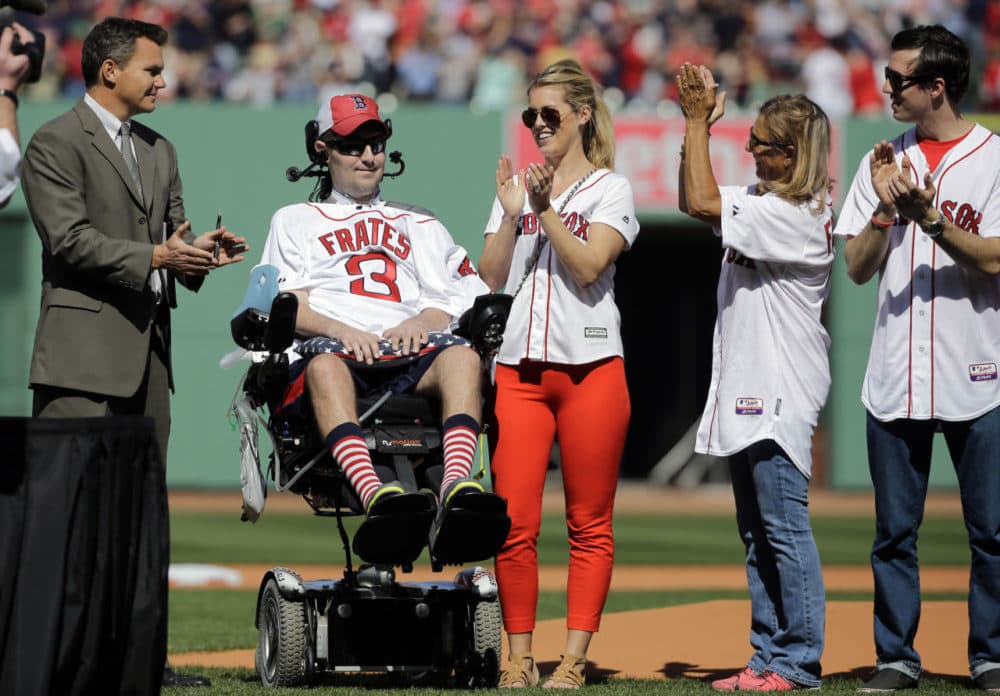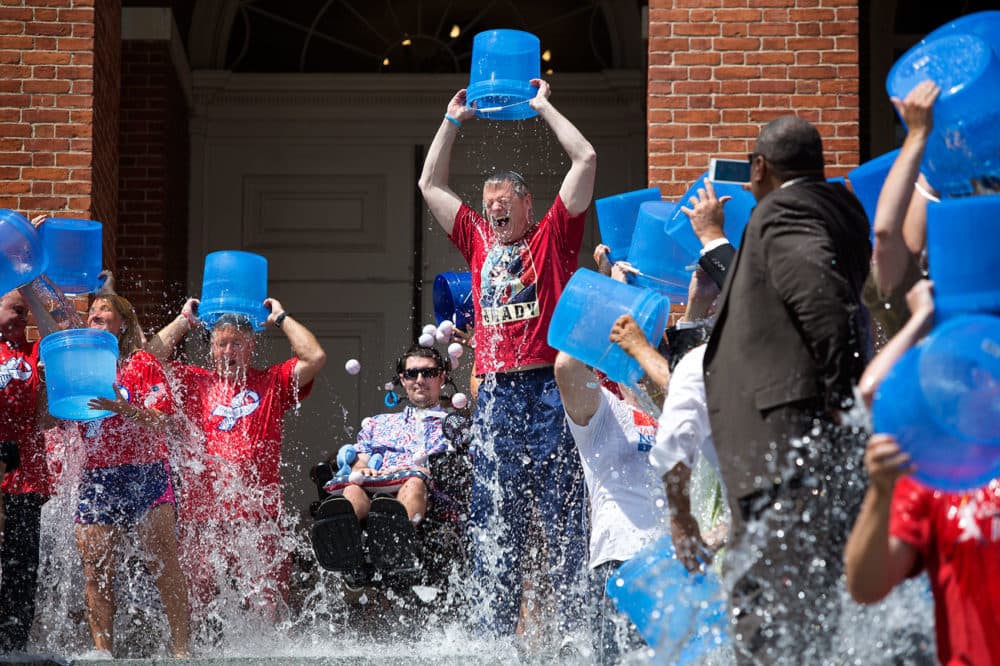Advertisement
'Ice Bucket Challenge' Inspiration Pete Frates Has Died Of ALS

Pete Frates, who helped popularize the "Ice Bucket Challenge" and raised millions of dollars for ALS research, died Monday of the disease. He was 34 years old.
In a statement, Frates's family said he died peacefully, surrounded by family.
"We ask that you celebrate Pete and the hope that he has given to so many by following his daily affirmation: Be passionate, be genuine, be hardworking, and don’t ever be afraid to be great," the statement continued.
Before ALS began to debilitate his body, the Beverly native was a star athlete, first at St. John's Prep and then at Boston College. Frates captained the BC baseball team with a powerful left-handed swing that, at times, looked a bit like Lou Gehrig's.
In perhaps the best game of his career, in 2007, Frates hit a grand slam, smashed another homer, and drove in a whopping eight runs.
Though Frates wasn't Gehrig's equal on the field, he may have matched the Hall of Famer in drawing attention to the disease they shared. It was Gehrig's diagnosis in 1939 — and his famous speech at Yankee Stadium — that put a largely unknown condition in the spotlight.
"I might've been given a bad break," Gehrig said, as ALS cut short his career, "but I've got an awful lot to live for."
Frates adopted the same attitude as he battled what's often called Lou Gehrig's disease. It's a fatal, progressive condition that erodes muscle function. People with ALS lose the ability to speak, walk and, eventually, breathe on their own.
While Gehrig introduced many Americans to ALS, Frates became a rainmaker, literally and figuratively.
"He called me on the day he was diagnosed, and it was not half a second feeling sorry for himself," said Frates's former baseball coach at BC, Pete Hughes. "He was going to get out and motivate and speak and inspire. He embraced it, and he looked at it as an opportunity for him and his calling in life. That wasn't flowery talk from Pete to make me feel better about the diagnosis; that was how Pete was wired and how he was raised."
Advertisement
In 2012, just eight months after his diagnosis, Frates was already receiving recognition for his advocacy from the ALS Therapy Development Institute.
"I'm going to hopefully capitalize on this and realize that this is the lot in life I've been given and be able to go forward and get you all the money and resources that you so deservedly need," he said when accepting an award.
Frates's fundraising breakthrough came a couple of years later. On Facebook in the summer of 2014, he challenged a mix of friends and celebrities, including Tom Brady and Julian Edelman, to dump buckets of ice water on their heads — or donate to the ALS Association to avoid getting cold and wet.
Ultimately, the Patriots donated and staged a team dousing.
Frates didn't invent the Ice Bucket Challenge; it's a fundraising gambit that philanthropy experts say has been around for a while. But Frates's connections in the sports world helped make it a viral sensation. Top athletes like LeBron James posted videos of their soakings on social media. So did Oprah, Dwayne "The Rock" Johnson and Bill Gates.
Steve Kowalski, of Boston, took the challenge, too. Then he got his own ALS diagnosis in 2017.
One of the first things he did was attend a Pete Frates Day celebration at Boston City Hall.
"No one, even in my family, knew at that point — just myself and my neurologist," said Kowalski, now 55. "Pete's wife and his mom, Nancy, both spoke and drew me in, and I will never forget how that was the beginning of the fog lifting for me because they taught me to fight."
Kowalski has since become a fundraiser for ALS research and sits on the board of the ALS Association of Massachusetts.
At the peak of the Ice Bucket Challenge, critics of the challenge said it could encourage something called slacktivism. The premise of the challenge was that anyone willing to get drenched didn't have to give money, so participants could claim to be activists while slacking on the donations.
But it turned out that a lot of people opened the icy floodgates and their wallets, too.
Paul Schervish, founder of the Center on Wealth and Philanthropy at Frates's alma mater, Boston College, said people like to feel they're making a difference, "and that was what was going on in the Ice Bucket Challenge. When you got that [water] dumped on you, that emphasized that you were the actor, not the organization. And that is a major reversal in the understanding of fundraising that organizations need to learn."
Over eight weeks in 2014, the Ice Bucket Challenge raised $115 million, according to the ALS Association. Most of the money went toward research. It even helped scientists discover a new gene that contributes to the disease.
But donations waned as enthusiasm for the challenge faded.
"I wish we would see more of a residual [effect], honestly," said Kris Moussette, who chairs the board of the ALS Association of Massachusetts. "There was a short time frame where there was heightened awareness and a lot of excitement and a lot of donations."
As Frates's health inevitably worsened in recent years, he and his family turned their fundraising focus toward caring for patients with advanced ALS.
In an online video for the Frates Family Foundation, which earned nonprofit status in May, Frates's mother, Nancy, says, "The care is just overwhelming. Care versus cure is a debate that we have all the time in the ALS world because the cure is probably going to be for those soon to be diagnosed. The care is for people who are living today with the disease."
Frates spoke openly about the demands his care placed on loved ones — especially his wife, Julie, who now must raise their young daughter without him.
Through his family's foundation, part of Frates's legacy will be helping to ease the burden on other families by paying for medical equipment, home health aides and similar expenses.

This article was originally published on December 09, 2019.
This segment aired on December 10, 2019.

